In the FixThePhoto team, my main responsibilities are reviewing gear and transforming my findings into comprehensible articles. While testing different equipment, I usually need to read lots of manuals, guides, and reports. Still, wading through long materials is exhausting, so I decided to look for tools that can extract the key insights from such papers. There are lots of programs out there, so I picked the most popular ones and tested them diligently.
To create this list, I tested each option on a simple project. I needed to summarize a detailed 60-page photography guide, which provides handy tips and visual explanations to check how well it captured both the text and key takeaways. This process helped me evaluate their functionality and find out how accurate and fast these solutions are. I also considered the interface design and unique features.
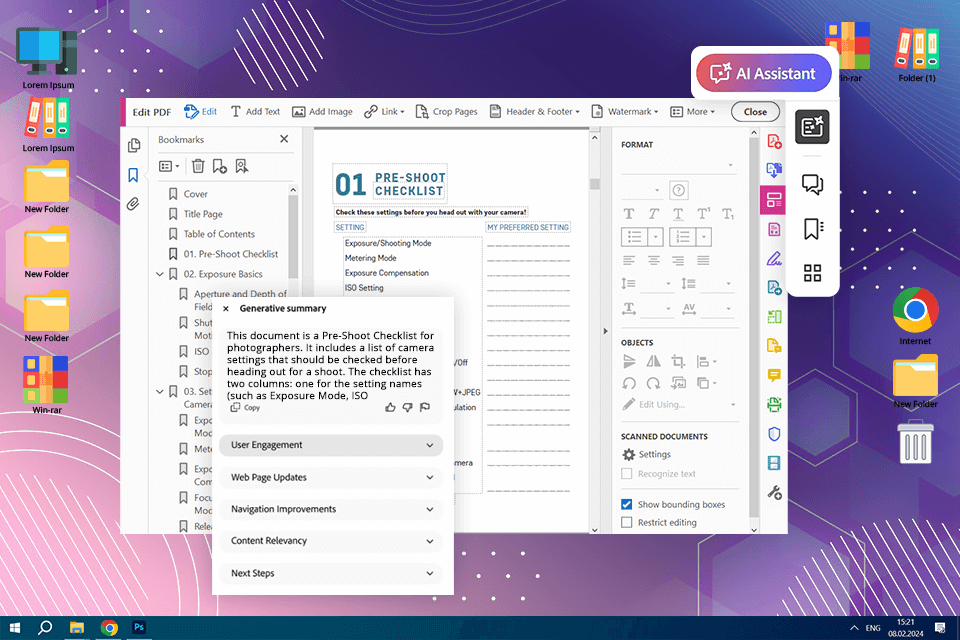
The task I assigned to Adobe Acrobat AI Assistant was to summarize the key aspects of my guide. The tool needed only a few moments to present the main points of the material neatly and concisely. This allowed me to pinpoint handy insights without scrolling through multiple pages.
The attribution feature was also useful. After clicking on the numbered reference, the tool highlighted this text segment in the document, making things easier. When my query became more complex, like the analysis of the comparison of lighting techniques, it still got the job done perfectly.
I also like the search function. Instead of reading all 60 pages of the document, I just typed in the keywords and immediately saw the needed information. For instance, I entered “softbox lighting” and “high-key vs. low-key contrast”, and this PDF reader directed me to the specific sections. Besides, it delivered a summarized answer related to the topic in focus.
The table analysis is another cool feature of this AI tool for summarizing PDF documents. The guide I worked with had lots of comparison charts with perfect camera settings in relation to lighting conditions. Thanks to Acrobat AI Assistant, I managed to grasp the main points, such as when working in a controlled studio environment, it is better to choose lower ISO settings. Still, if you have a document with lots of confusing details, make sure to double-check the answers generated by the program.
Price: from $4.99 per month (for add-on).
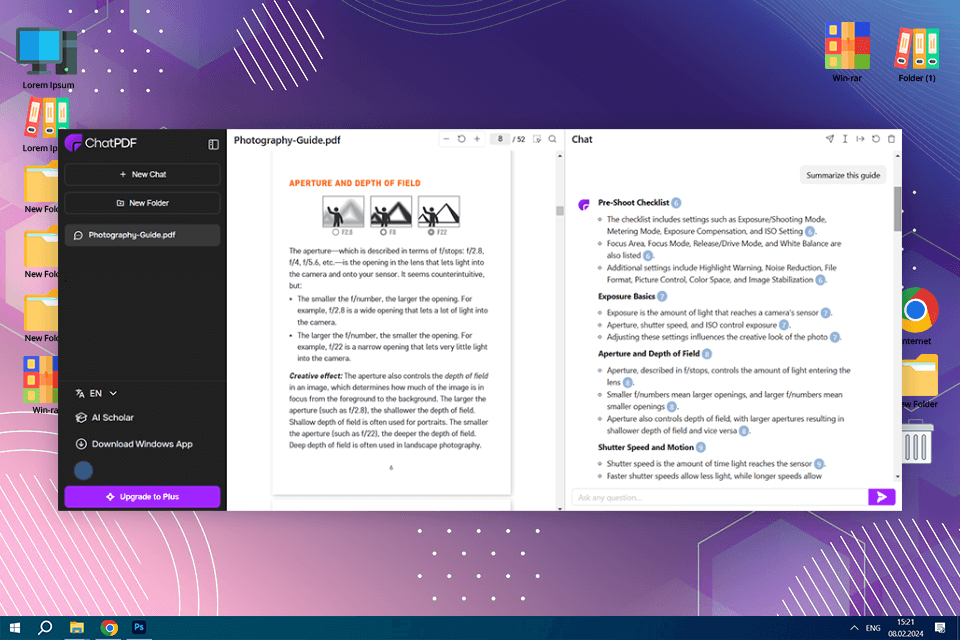
This AI article summarizer allows for creating quick and correct summaries, providing me with the main takeaways without scrolling through document pages. The multilingual support was beneficial as well, especially when I analyzed photography articles in different languages.
Besides, I had no trouble checking the facts, as when I asked the targeted questions for my PDF file, like the guidelines for building portrait composition, the smart algorithms provided accurate responses linked right to the content. However, when the inquiry was to explain the advanced editing methods in detail, the responses were generalized.
Still, the tool really impressed me with its ability to chat with multiple PDFs at once, which simplified the comparison of different photography resources. All in all, ChatPDF can become a handy assistant for anyone who deals with multi-layered docs and PDF organization tasks.
Price: free version or from $5 per month.
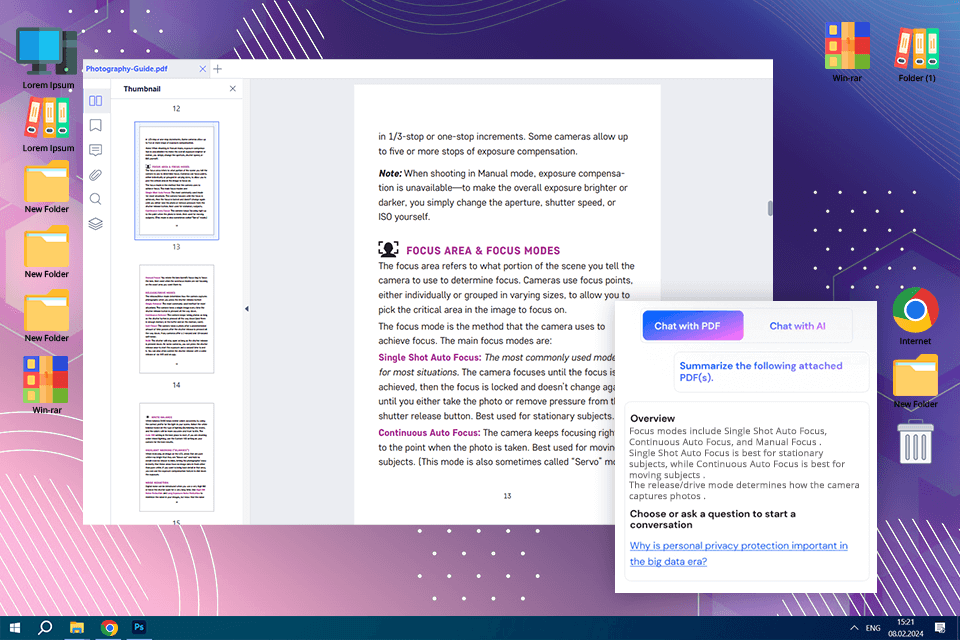
I took advantage of an AI Summarizer offered by PDFelement for pulling out the key points from my photography guide. The tool did a great job highlighting the most important tips and insights, which I then saved as a Markdown list for a more convenient reference. This feature was especially useful when compiling a summary for my team.
I also tested the performance of the AI chat by questioning it about the lighting techniques described in this guide. The responses were comprehensive and linked right to the original sections, allowing me to navigate the needed parts of the PDF with ease.
This tool especially appealed to me with its ability to build PPT from PDF. I benefited from this option to turn the summary into a captivating presentation about photography concepts for my team. The response structure is intuitive, but you’ll need to spend time mastering its UI, as it contains unlabeled buttons.
Price: from $79.99 per year; free trial is available.
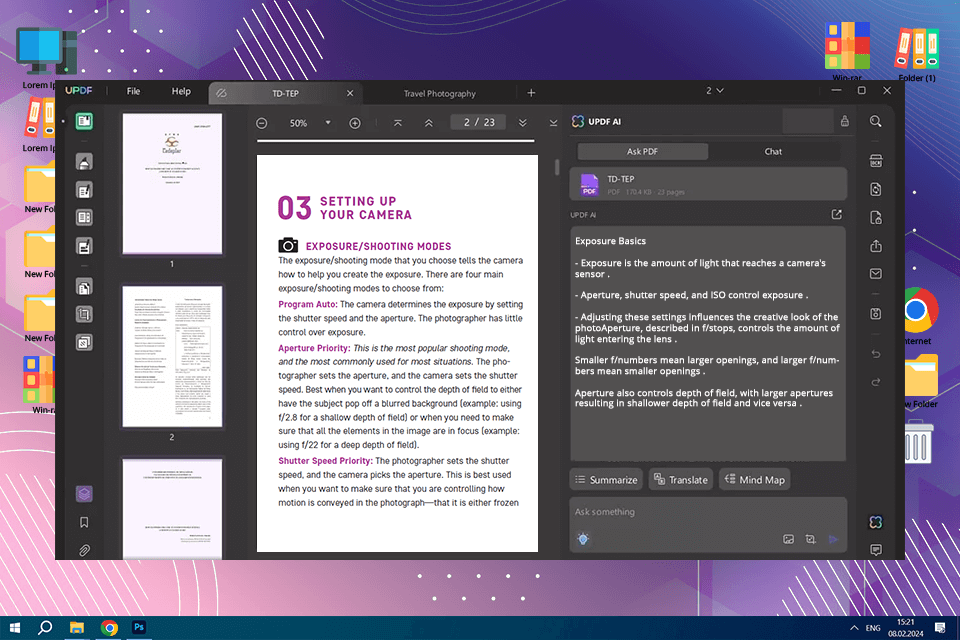
UPDF is a great AI document summarizer that offers speedy performance and high-quality results. It coped with the task of core concepts and keyword extraction without missing crucial details. This feature was a real lifesaver for me, as I could devote more time to other project essentials without slipping through all 60 pages manually.
The highlight of this tool is the AI mind map feature, which presents the guide’s structure in an understandable visual format, which is ideal for brainstorming sessions and planning out teaching points. Demonstrating annotations and data in charts was also a no-brainer, and I had no trouble preparing my notes for a team presentation.
Undoubtedly, the tool offers a powerful toolkit, but its interface is quite difficult to learn, so I needed to spend a lot of time navigating its advanced options at first. But, in general, UPDF offered all the needed features to support my work without unnecessary hassle.
Price: from $29 per quarter (for AI assistant); free trial is available.
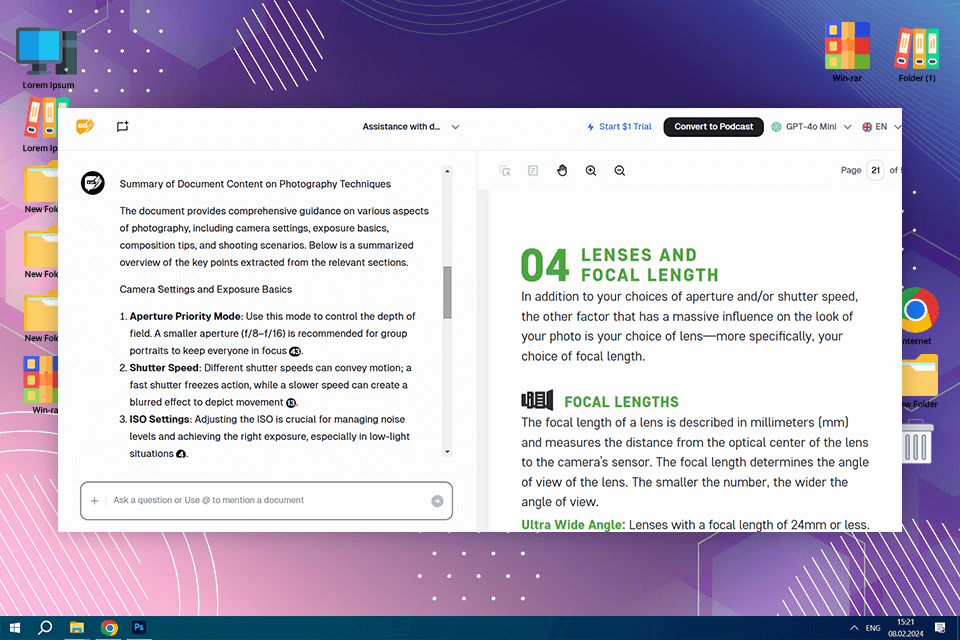
With AskYourPDF, the analysis of complex docs became a pleasant and worry-free experience. The ability to chat with the document directly was a real surprise for me. Thanks to this interactive feature, which saved me a lot of time, I could get answers to specific questions like “What are the best tips for low-light shots?”
I had no trouble navigating the tool thanks to its PDF organizer, which saved me from many hours of scrolling and simplified the referencing of key sections. The availability of the Chrome extension was a pleasant bonus for me, as I could easily access and query PDFs right from the browser. This feature was especially useful when dealing with multiple sources.
However, the limit of 100 pages offered in a free version is definitely a stumbling block for people whose projects are a bit larger than mine. Overall, AskYourPDF offered a chat-based approach for summarizing and querying processes.
Price: Free version or from $14.99 per month.
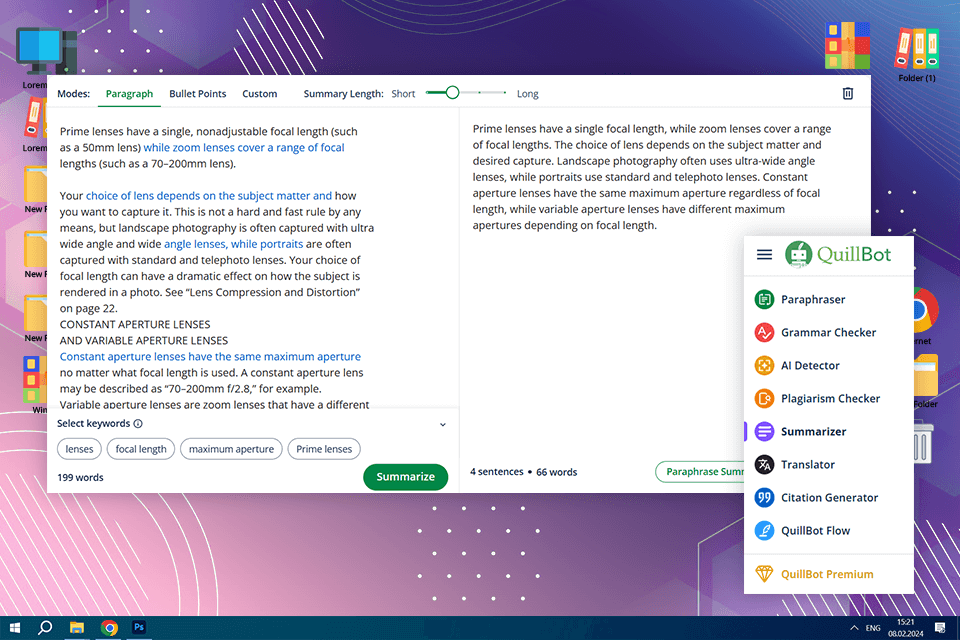
If you want flexibility with document summarization, QuillBot can be the best AI summarizer for you. There are 2 modes – Key Sentences (a summary that consists of the most important lines) and Paragraph (a summary that is still concise but looks like a text with several paragraphs). You can choose the mode that suits you best.
I opted for the Paragraph mode and received a well-structured output with a bunch of paragraphs. The text was easy to read and understand, focusing on the key aspects of the guide. Still, I didn’t get links to the sources, so I had to look for them manually to verify the data.
Another issue with this free PDF editor is poor performance with tables and charts. My guide contained such elements, and the program failed to process them properly. So, if you have a short document with no graphical elements, QuillBot will handle it properly. However, if there are tables and visual data, it may be less helpful.
Price: Free with limitations; Premium from $4.17/month (billed annually).
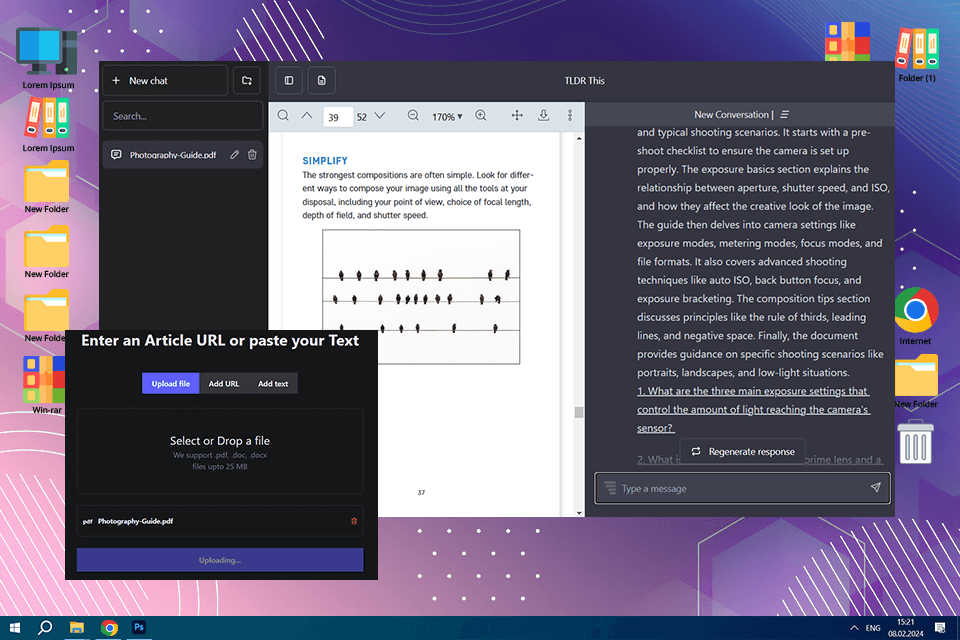
This AI summary tool also offers 2 modes to choose from. You can go for Extractive if you want to get direct sentences from the text. Alternatively, you can choose Abstractive, and your summarized text will sound more natural. I think that the Extractive mode works perfectly for general text summarization, especially if you need original wording.
Still, I also tested the Abstractive mode to make this overview as unbiased as possible. Generally, the summary became more fluid. However, I didn’t like an incorrect interpretation of some concepts. For example, the program didn’t explain such terms as “exposure triangle” and “dynamic range” properly.
One more weak point of TLDRthis is the lack of source attribution and table analysis. All in all, if you are looking for basic AI software capable of making quick text-based summaries, it will suffice. In case you need in-depth insights from long and complex documents, packed with tables and similar stuff, you should search for a more advanced alternative.
Price: Free with limitations; Premium from $4.99/month (billed annually).
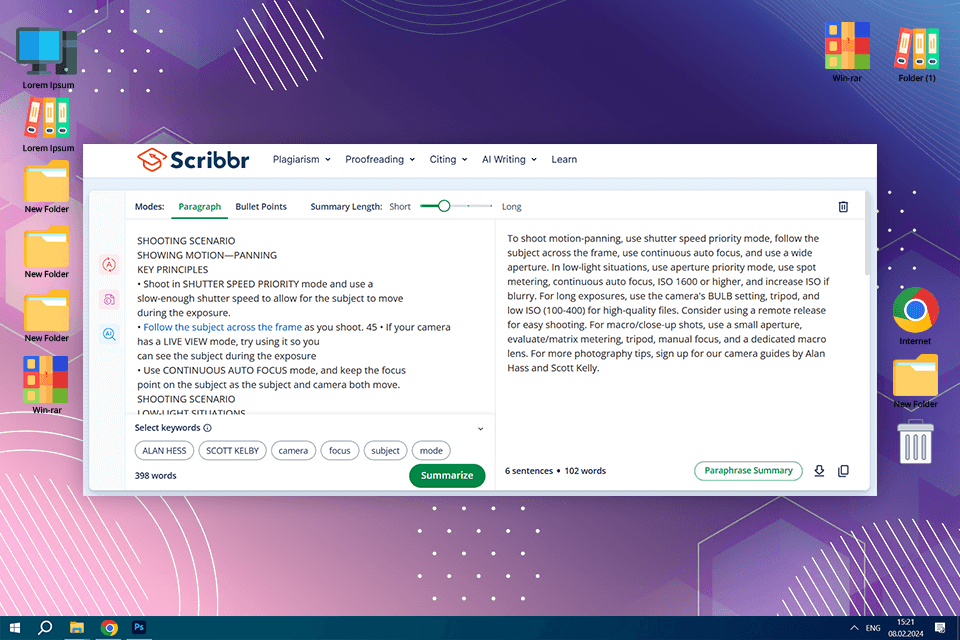
When using this AI text summarization instrument, you need to copy-paste your text, and Scribbr will extract the main points. Using it is easy, thanks to an intuitive interface and smooth navigation. Besides, there are no distractions that can complicate the process. I pasted my text, chose a suitable summary length (there are short and detailed options), and waited for the AI to deliver the result.
Generally, I’m pleased with what I got. The summary sounded logical and understandable. Besides, it was a proper interpretation of the guide rather than a word-by-word rephrasing. It happens that similar tools simply pull out key sentences, but that isn’t the case with Scribbr. It delivers truly high-quality summaries.
Still, there are several shortcomings to keep in mind. First, you can’t upload files but have to copy-paste the needed sections. If you have a long document, this process can drive you crazy. Second, the program doesn’t give links to sources for instant verification. If you have any doubts about the credibility of your summary, you have to check it manually.
Price: Free (no premium version available).
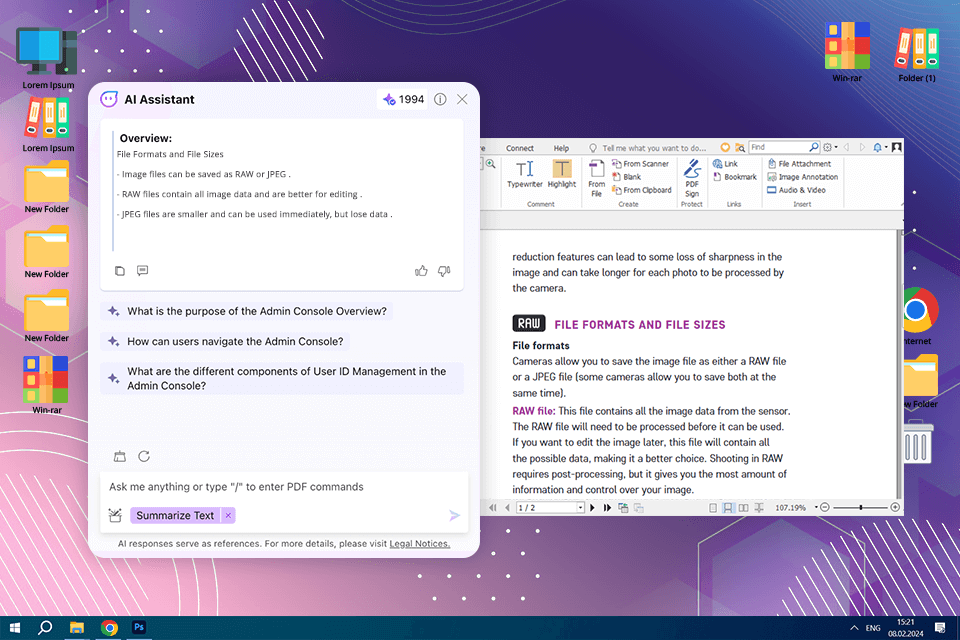
Foxit’s AI document summary tool was an indispensable assistant for me when I worked on my project. It produced concise overviews, which allowed me to devote more time to crucial details without scrolling through pages, boosting my efficiency.
With the Q&A feature in this AI tool to chat with PDF, I could ask such questions as “What are the key steps for shooting landscapes?” and get direct answers in an instant. I also appreciate handy rephrasing and translation tools, which were quite useful for adapting content for different audiences.
However, the daily limit on prompts was a drawback for me, particularly when dealing with multiple docs in a day.
Price: Free version or from $15 per month.
I got down to testing AI PDF summarizers with the desire to find tools that can genuinely expedite my workflow. I have to sift through long documents every day at FixThePhoto, I needed to see if these tools were the real deal. So, I used a 60-page photography guide loaded with visuals and tables to see if they could handle the pressure.
Armed with expert feedback and a critical eye, I focused on the ease of use, accuracy, features, data handling, and, of course, cost. Over several days, I evaluated Getrecall.ai, Jasper, Get Digest, Notta, Paraphraser.io, Hypotenuse AI, and other programs.
Step 1. Considering ease of use
I think that AI to summarize article should simplify your life instead of making it even more stressful. So, I studied the interface of every program, how easy it was to navigate and find specific tools, and whether summarization was understandable. Any platform that evoked confusion was dismissed.
Step 2. Evaluating summary quality and accuracy
At FixThePhoto, we can’t afford vague or misleading summaries. All our guides and reviews include accurate, credible information. A great AI tool doesn’t just shrink text. It distills key insights without losing the meaning.
I judged each AI summarizer on three crucial factors:
Step 3. Exploring feature versatility
Summarizing is great, but I wanted to learn whether those AI tools did more than just shrink text. So, I checked:
Step 4. Checking data handling capabilities
To my mind, a good AI text summarizer should handle visual data equally well. I paid attention to:
Step 5. Analyzing pricing and subscription plans
No matter how fancy an AI summarizer is, if it breaks the bank, our FixThePhoto team will hardly use it. So, I looked into: